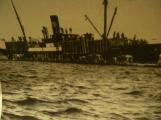74
Wallace Ship Loading Horses, Wallace, Nova Scotia, Canada20th Century
Wallace, Nova Scotia, Canada
 Credits:
Credits:Wallace and Area Museum
75
With the coming of steam and the iron ships, the Nova Scotia shipyards turned to building smaller, faster schooners, mostly for coastal trade. However, almost all the shipyards that had employed hundreds of men were silent by 1920.Arthur Treen in 1985 wrote of a number of ships being built around Malagash, including the small lobster fishing boats that did not have engines, until 1912. The Treens had a shipyard using wood from their Grandfather's lumber mill on Golding Brook. There was a yard west of Stewart's (MaNabs) Island,and on Shipyard Island, and one near the school house. He reports Alexander Mackenzie as building all kinds of boats, fishing and sailing, including a whaler.
With increasing shipping it was necessary to build lighthouses along the coast. By 1872 there were 75 manned lighthouses. Some were painted in special colour patterns for easy identification. Fog bells were often on the new buoy system that marked channels and hazards. The first one was invented by Robert Foulis, a light keeper in the Bay of Fundy, Nova Scotia. He used the note 'G' as it carried the greatest distance. Some harbours had a signal system to inform them of incoming ships, and ships had to carry lights: red for port, green for starboard, and a mast light for ships at anchor. These sailing ships demanded skill and nerve, with no radar, no radio, no weather forecasts, incomplete and inaccurate charts, and only a sextant and clear skies for navigating, and no engine to use to get out of trouble.
Wood ships demanded constant pumping with wood pumps, and rough weather 'worked' the seams of ships, so water came in faster than it could be pumped.
Every community suffered from loss of ships often with the entire crew, but there were always men prepared to take the risk and the often tough working conditions on board. For the wives and families awaiting news or the sighting of the ship, it must have been a lonely and worrying life.